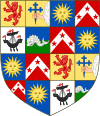William Randal McDonnell, 6th Earl of Antrim
| Earldom of Antrim | |
|---|---|

Coat of arms of the Earls of Antrim of the second creation: quarterly McDonnell and Kerr
|
|
| Creation date | 1620 |
| Monarch | James VI and I |
| Peerage | Peerage of Ireland |
| First holder | Randal MacDonnell |
| Present holder | Alexander McDonnell, 9th Earl of Antrim |
| Heir apparent | Randal, Viscount Dunluce |
| Subsidiary titles | Viscount Dunluce |
| Seat(s) | Glenarm Castle |
| Former seat(s) | Dunluce Castle |
Earl of Antrim is a title that has been created twice, both times in the Peerage of Ireland and both times for members of the MacDonnell family, originally of Scottish origins. This family descends from Sorley Boy MacDonnell, who established the family in County Antrim. His fourth son Randal MacDonnell was created Viscount Dunluce, in the County of Antrim, in 1618, and Earl of Antrim in 1620. Both titles were in the Peerage of Ireland. His eldest son, the second Earl, fought as a Royalist in the Civil War and was created Marquess of Antrim in the Peerage of Ireland in 1645. He was childless and on his death in 1682 the marquessate became extinct.
He was succeeded in the viscountcy and earldom by his younger brother, the third Earl. He represented Wigan in the English House of Commons and also served as Lord Lieutenant of Antrim. Lord Antrim was attainted in 1689 for his support of King James II but was restored in 1697. His grandson, the fifth Earl, was Governor of County Antrim. He was succeeded by his son, the sixth Earl. He represented County Antrim in the Irish House of Commons. Lord Antrim had no sons, and as there were no other male heirs left of the first Earl, the titles were heading for extinction. However, in 1785 King George III created him Viscount Dunluce and Earl of Antrim in the Peerage of Ireland, with remainder to his daughters in order of seniority and the heirs male of their bodies. In 1789 he was further honoured when he was made Marquess of Antrim in the Peerage of Ireland, with normal remainder to the heirs male of his body.
...
Wikipedia

